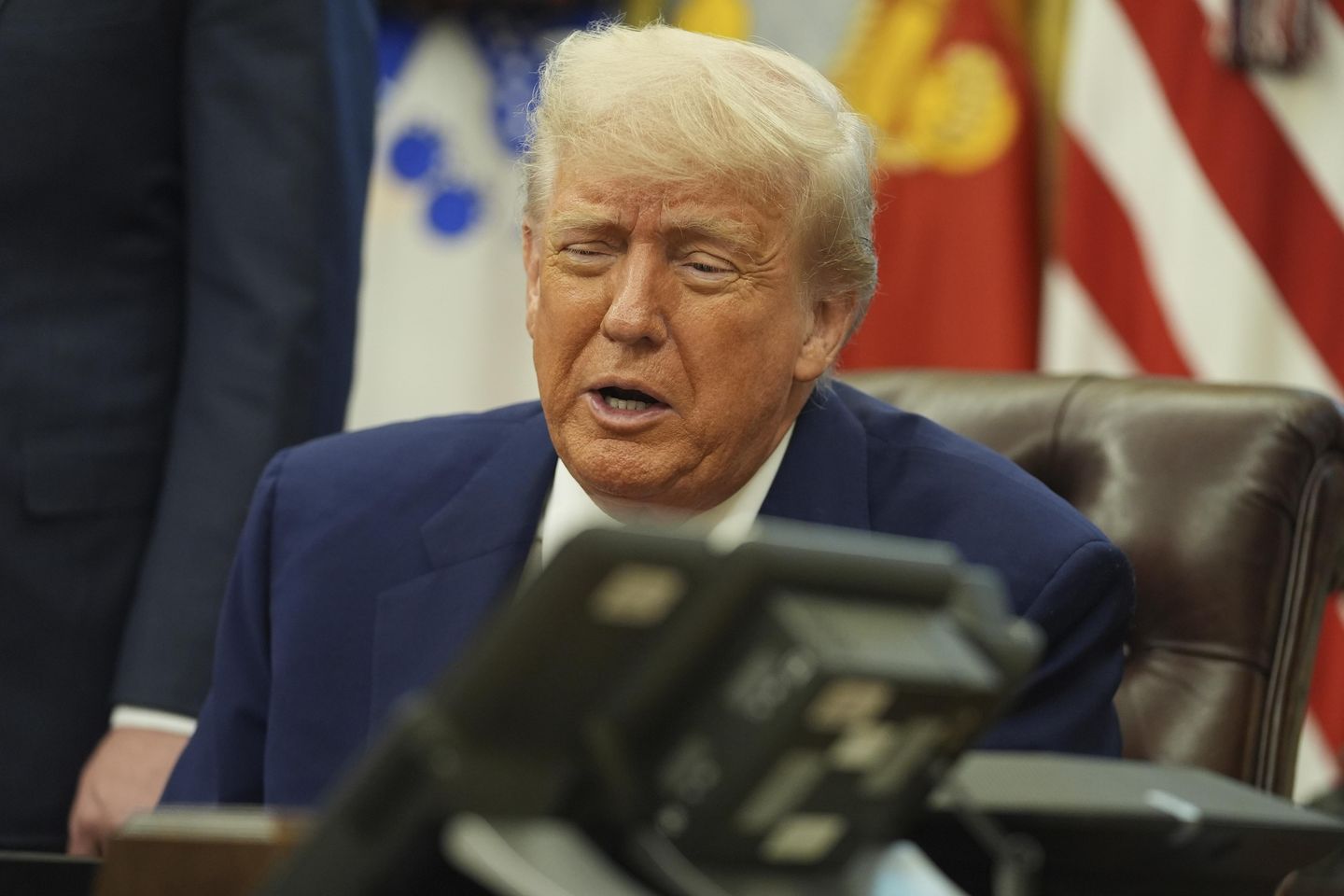
President Trump on Thursday said the U.S. struck a trade deal that will open the British market to plenty of American farm products, chemicals and machinery.
Mr. Trump, speaking in the Oval Office, said beef, ethanol and other agricultural products will flood into the U.K. He said the British side also agreed to drop certain nontariff trade barriers.
In return, the U.K. will see new business partnerships with major American companies and receive relief on sector-specific tariffs. U.S. tariffs on British cars will be reduced from 27.5% to 10% for a quota of 100,000 British autos, and steel and aluminum tariffs will be slashed to zero.
“This is now turning out, really, to be a great deal for both countries,” Mr. Trump said in the Oval Office.
The president said a few terms were still being ironed out, though “we think just about everything’s been approved.”
The pact could be the first of dozens of promised trade deals tied to Mr. Trump’s “Liberation Day” plan, which threatened hefty tariffs on countries that don’t reduce their trade barriers.
Wall Street reacted positively to the agreement as investors seek White House progress in turning its aggressive tariff tactics into better trade terms around the globe.
In April, Mr. Trump imposed a blanket 10% tariff on all imports. He threatened heftier levies on countries that sell plenty of products to American consumers but don’t buy nearly as much from U.S. producers.
Mr. Trump paused the heftier levies for 90 days to allow time for negotiations. India, Japan and South Korea were out front in talks, but the British closed the first deal.
“We have a great relationship,” Mr. Trump said. “It’s been an honor doing business with all of them.”
Mr. Trump said he was surprised at the size of the British economy.
“It opens up a tremendous market for us,” he said.
The U.K. left the European Union in 2020, forcing Britain to go alone in trading with the rest of the globe. Earlier this week, the U.K. struck a trade deal with India.
The U.S. and U.K. have been trying to reach a bilateral agreement since the British exit from the EU, called Brexit, so the pact could be seen as the result of long-term talks and not just weeks of negotiation.
“The U.S. and U.K. have been working for years to try and make a deal, and it never quite got there; it did with this prime minister,” Mr. Trump said, referring to Keir Starmer.
Bigger challenges are on the horizon for Mr. Trump’s trade team.
The U.S. and China are locked in a trade war, with tariffs exceeding 100% on either side, and other deals could take time.
Other Asian trading partners are negotiating but face pressure at home since they don’t want to disadvantage their export-heavy industries. Some nations face other factors, such as domestic elections, while India agreed to a road map for a U.S. trade deal but is distracted by tit-for-tat military strikes with Pakistan.
Nevertheless, the breakthrough with the U.K. will be seen as a win for both sides.
Mr. Starmer underscored the close U.K.-U.S. relationship, saying the deal coincided with the 80th anniversary of the Allied victory in Europe in World War II.
Like Mr. Trump, Mr. Starmer said some details must be worked out, but “there’s a fantastic platform here.”
Mr. Trump’s tariff plans have been driven by trade deficits, in which the U.S. imports far more from countries than what it sells.
However, the U.S. had a trade surplus with the U.K. of nearly $12 billion in 2024.
America exported nearly $80 billion worth of goods while importing about $68 billion from Britain, according to the U.S. trade representative.
For that reason, the U.K. faced only the baseline 10% tariff under Mr. Trump’s plan compared with heftier tariffs on countries with big trade imbalances with the U.S.
Commerce Secretary Howard Lutnick said the 10% tariff will remain and the deal would open up $5 billion worth of opportunities for U.S. exporters, while bringing in $6 billion in tariff revenue.
The British side found ways to favor U.S. products instead of ones from other countries, while protecting jobs for British workers, he said.
In a noted benefit for the U.K., British companies will be able to send key parts to the Boeing aerospace company in the U.S.
The deal should also make it easier for the British to send drugs, cars, food and other goods to the U.S.
Mr. Trump recently chafed at widespread impatience over the lack of progress with other countries.
“We don’t have to sign deals,” he said. “They have to sign deals with us. They want a piece of our market, we don’t want a piece of their market. We don’t care about their market.”
Mr. Trump pivoted again on Thursday, saying the U.K. pact is the first of many deals to come.
“We have numerous deals,” Mr. Trump said, noting Treasury Secretary Scott Bessent is meeting with the Chinese in Switzerland over the weekend.
“They very much want to make a deal,” Mr. Trump said. “They look forward to doing it with us in a very elegant way.”
The president said his patience won’t be unlimited, however, and at some point, the U.S. will set a permanent tariff level.
The 10% baseline level should not be considered a template for other deals, he said, characterizing it as a bit too low for some other countries.
Leaders in Europe say they’re open to negotiation but they will not back down from a trade fight.
The EU on Thursday outlined a list of U.S. products that could be targeted with higher tariffs if the bloc and the U.S. don’t reach a trade agreement.
The products, worth $107 billion, are designed to prod the U.S. into serious negotiations before Mr. Trump’s reciprocal tariffs are unfrozen. The list includes farm products and car and airplane parts.












